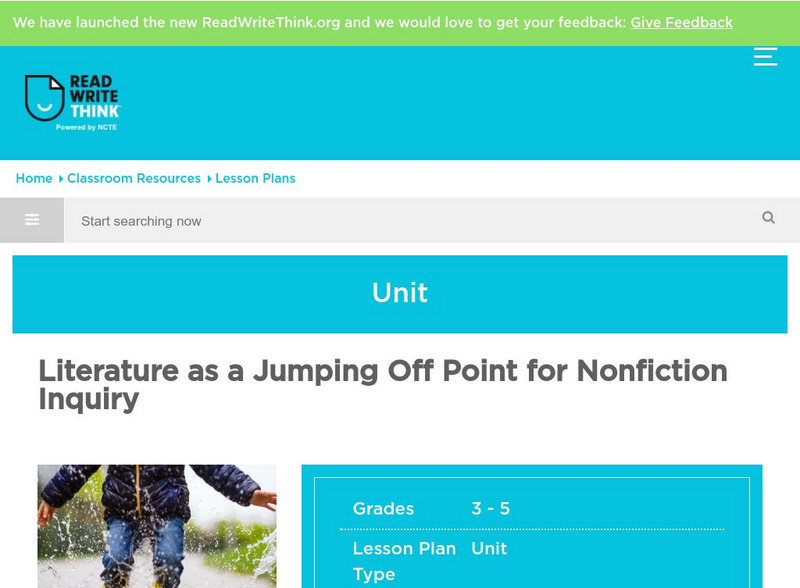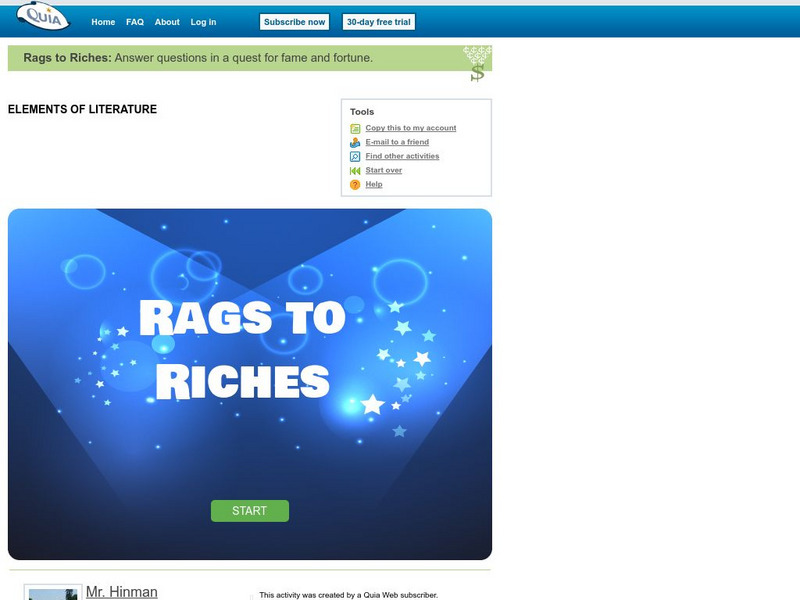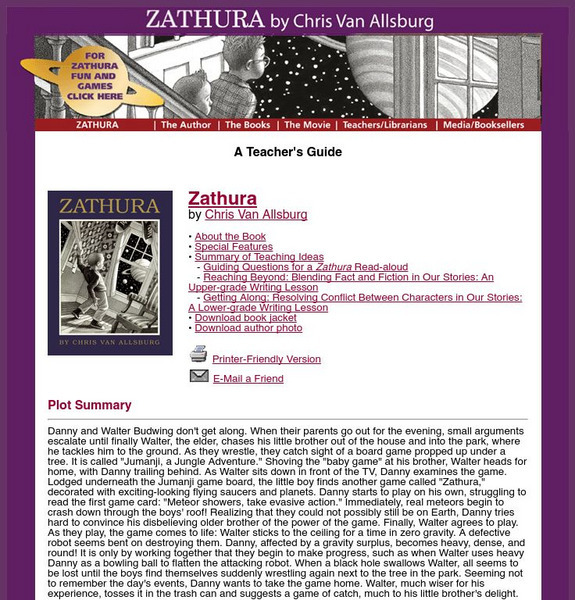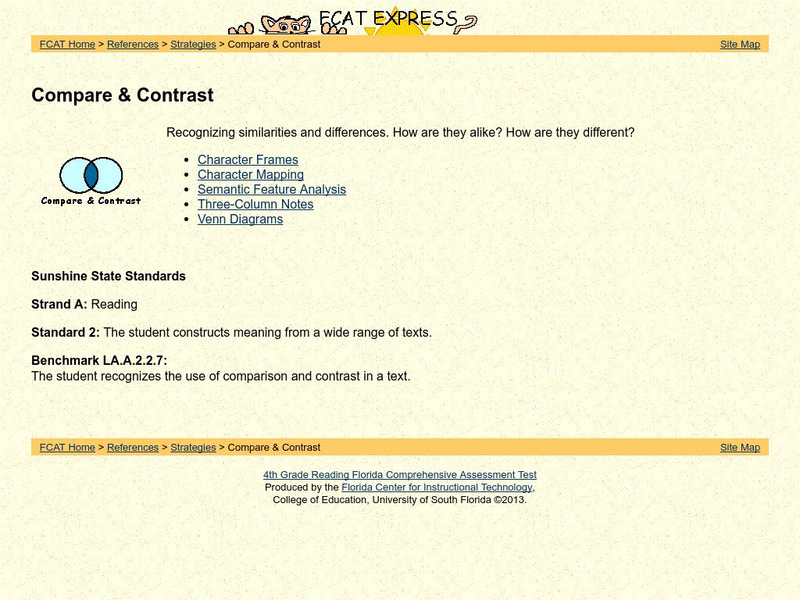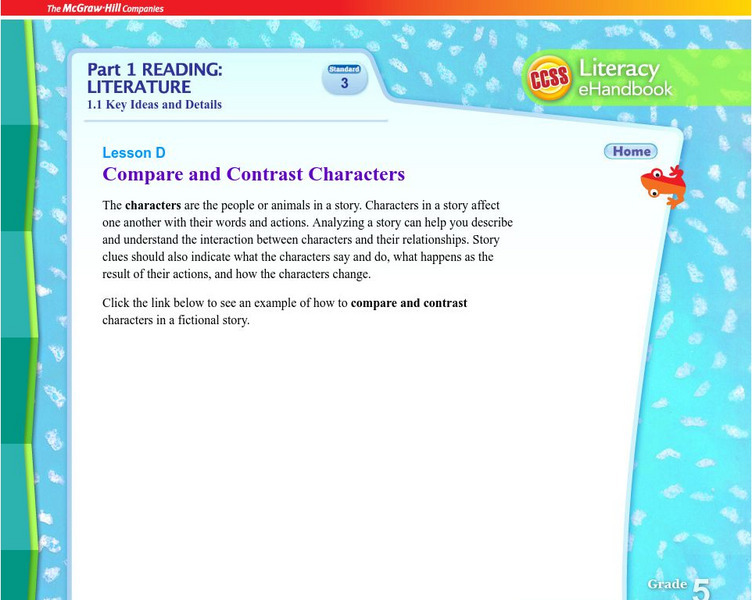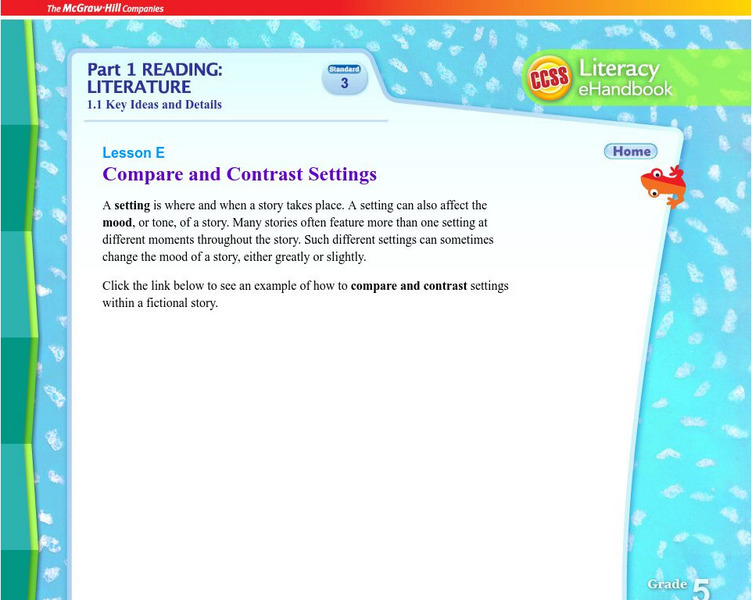Curated OER
Mc Graw Hill: Part 1 Reading Literature: Folktale
Understand how to read and find the message the exist in a story. Learn how folktales include messages in their stories.
Curated OER
Mc Graw Hill: Part 1 Reading: Literature: Describe Characters
A reference guide on how to analyze characters in a story.
Curated OER
Mc Graw Hill: Compare Characters' Point of View
Defines and explains how to show how different characters think and feel.
Other
A Small Tall Tale From the Far Far North, by Peter Sis [Pdf]
This lesson plan is for the book A Small Tall Tale from the Far Far North and is designed for students in grades 2?4. Teachers can use the ideas here for history, literature, art, social studies, geography, research skills, and to spark...
Other
Bedtime Story: Whimsical Stories for Reading
Awesome site with hundreds of stories by published and unpublished authors to encourage reading stories together and out loud. Each story also has a section titled "What's it all about" which gives background information along with...
ReadWriteThink
Read Write Think: Book Report Alternative: Examine Story Elements Using Comic Stri
Comic frames are traditionally used to illustrate a story in a short, concise format. In this lesson, students use a six-paneled comic strip frame to create a story map, summarizing a book or story that they have read. Each panel retells...
ReadWriteThink
Read Write Think: Planning Story Characters Using Interactive Trading Cards
Students use trading cards to examine fictional characters in a story.
ReadWriteThink
Read Write Think: Flying to Freedom: Tar Beach & the People Could Fly
Comparing and contrasting works and looking for underlying themes and messages are at the heart of this multicultural lesson plan. Provides links to several background resources, and suggestions for assessment.
ReadWriteThink
Read Write Think: Literature in Nonfiction Inquiry
This lesson plan involves students working in groups after reading a work of literature to develop text sets. Included in the lesson plan is an overview, practice, objectives, resources, preparation, and more.
ReadWriteThink
Read Write Think: Question and Answer Books From Genre Study to Report Writing
Contains plans for eight lessons that explore Question and Answer Books and ask young scholars to do research in order to write their own. In addition to objectives and standards, these instructional plans contain links to sites used in...
ReadWriteThink
Read Write Think: Using Picture Books to Teach Characterization
Contains plans for two or three lessons that ask students to examine characterization in picture books to use as models for their own writing. In addition to objectives and standards, this instructional plan contains links to sites used...
ReadWriteThink
Read Write Think: Zines for Kids Multigenre Texts About Media Icons
Contains plans for nine lessons that ask students to create multigenre zines for popular culture figures that include letter, persuasive, narrative, acrostic poetry, comic, and biography/autobiography writing. To accomplish this,...
ReadWriteThink
Read Write Think: Identify, Compare, Write Nonfiction
Lesson that introduces the concepts of nonfiction to elementary students. Through reading and interactive lessons, students engage the genre of nonfiction and begin to write their own examples.
ReadWriteThink
Read Write Think: Mapping Characters Across Book Series
This lesson plan examines the changes and developments in characters which appear in a series. Included in the lesson plan is an overview, practice, objectives, resources, preparation, and more.
ReadWriteThink
Read Write Think: Teaching the Compare and Contrast Essay Through Modeling
Contains plans for three lessons that teach young scholars how to write comparison contrast essays after modeling the form to them. In addition to objectives and standards, this instructional plan contains links to sites used in the...
Quia
Quia: Elements of Literature: Rags to Riches
Answer the 15 questions in this game about literary elements for the prize of fame and fortune. Java is required.
Austin Independent School District
Austin Independent School District: A Taxonomy of Literary Genre [Pdf]
A series of graphic organizers shows the progression of learning about literary genre, beginning in kindergarten and building through to fifth grade.
Writing Fix
Writing Fix: Showing Plots & Conflicts
In this lesson, recommendations from Ralph Fletcher's book called Live Writing will be used as a teacher reference. Students will write introductions to three different stories in their writer's notebooks, but each type of conflict must...
Houghton Mifflin Harcourt
Houghton Mifflin Books: Zathura by Chris Van Allsburg
This comprehensive teacher's guide for the book "Zathura" by Chris Van Allsburg provides us with an opportunity to examine how writers blend scientific information with a fictional story.
University of South Florida
Fcat Express: Compare & Contrast
Strategies to help students recognize similarities and differences provided by a standardized test preparation site intended for fourth grade. Includes strategies such as Character Frames, Character Mapping, Semantic Feature Analysis,...
Curated OER
Mc Graw Hill: Part 1 Reading: Literature: Compare and Contrast Characters
Learn how to compare and contrast characters on this site. Understand how comparing and contrasting characters is important for reading comprehension.
Curated OER
Mc Graw Hill: Part 1 Reading: Literature: Compare and Contrast Settings
To comprehend a story, students need to be able to compare and contrast the setting. Learn how to compare and contrast setting in this reference article.
Other
Write4 kids.com
This site provides a great deal of information on writing children's stories. Contains "Advice, instruction, insider tips, insight and inspiration."
TES Global
Blendspace: Personal Narrative Writing 3.w.3.3
A twelve-part learning module with links to images of notes, web sites, and videos that teach students how to write a personal narrative.









